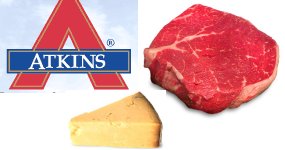November 27, 2003
The Atkins Economy: Low-Carbs as a Competitive Differentiator in the Food & Restaurant Industry
 Since it's Thanksgiving, I thought it'd be fitting, as we're all about to overeat, to think of the country's greatest - and arguably most successful, in terms of net pounds lost - diet trend and its effects on the economy. The Atkins Lifestyle has become more than just a trend. If you love to eat beef, you know it's gotten a lot more expensive of late, and so have a host of other high-protein, low-carb foods. Meanwhile, Unilever - parent company of Slim-Fast - is blaming Atkins for a 21 percent fall-off in profits for the competitor. Likewise, there are a lot of companies taking advantage of the Atkins Economy - here's an exceprt from another BrandChannel piece on the subject:
Since it's Thanksgiving, I thought it'd be fitting, as we're all about to overeat, to think of the country's greatest - and arguably most successful, in terms of net pounds lost - diet trend and its effects on the economy. The Atkins Lifestyle has become more than just a trend. If you love to eat beef, you know it's gotten a lot more expensive of late, and so have a host of other high-protein, low-carb foods. Meanwhile, Unilever - parent company of Slim-Fast - is blaming Atkins for a 21 percent fall-off in profits for the competitor. Likewise, there are a lot of companies taking advantage of the Atkins Economy - here's an exceprt from another BrandChannel piece on the subject:
-
As frustrated consumers warm to low-carb diets, food, beverage and restaurant brands have been right behind them. Big brands including Heinz, McDonald’s, PepsiCo, KFC, Coors and Hain Celestial Group either have just plunged into this marketplace or are making plans to do so soon, joining early committers such as Anheuser-Busch, with its hot-selling Michelob Ultra beer, and an array of small companies that have been feeding the trend for years. Sales for low-carb specialty-product companies such as Atkins Nutritionals Inc. are spiraling skyward, as is the low-carb business of Internet-based diet-plan companies such as eDiets.com.
On the flip side, the rising low-carb tide has buffeted major food companies, such as Kraft, that haven’t acted quickly enough to come along. It has taken the air out of once high-flying diet brands such as Slim-Fast, which are based on old trends of weight loss. And it has stunned entire segments of the food business that are carbohydrate-based, such as baked goods, pasta and orange juice.
"A lot of people believe in it, and [low-carb diets] certainly have had results in terms of weight loss for a lot of people," says Steven Reinemund, chairman and CEO of PepsiCo Inc. The Purchase, New York-based giant plans to launch new and reposition existing products into the low-carb segment as early as next year, says Reinemund.
"We’re not in business to tell people what’s right and wrong in terms of personal commitment to health programs," Reinemund continues. "But if they want low-carb alternatives, we want to make sure we have those alternatives in our portfolio. […]We do have programs in all of our businesses to capitalize on what we think is a trend."
Beverage-industry consultant Tom Pirko says that "the low-carb thing is being driven by successful products and by a lot of media coverage. It has the biggest consumer-consciousness badge in the industry right now, and companies see that."
Sam Rovit, food-industry partner for the consulting firm Bain & Co., says that low-carb has demonstrated such great appeal because it’s a relatively simple dieting message, similar to the low-fat mantra of several years ago. "People have always said, ‘Eat in moderation, and balance food groups,’ but that’s complicated -- it’s not an easy sound bite," he says. "But just saying ‘low-carb’ is an easy sound bite. People think, ‘I can follow that: Just cut out pasta, bread and beer.’ "
Yet not surprisingly for a trend that has moved so far, so fast, some food-company players and independent analysts already are hedging their bets about the staying power of the low-carb category, a major factor in corporate decisions about whether to opt in.
"Established food brands have to be very careful about this," says Julian Mellentin, editor of New Nutrition Business, a global trade journal. "They want to be opportunistic enough to take advantage of what mileage there is in chasing this low-carb phenomenon. But they have to be careful that they don't follow their opportunism over the cliff. And I don't think the good ones will."
While McDonald's Corp., for example, seems to have begun reversing its marketplace slide of the last few years in large part on the strength of new, better-for-you products such as salads, the brain trust of the Oak Brook, Illinois-based fast-food leader remain skeptical of the low-carb phenomenon. "[W]hen customers start telling us that this is what they want, and we start seeing levels of that interest rise, we'll start doing something about it," says Ken Barun, the corporate vice president whose bailiwick includes "healthy lifestyles." "But we haven't seen customers doing that yet; there's no groundswell."
- Arik
Posted by Arik Johnson at November 27, 2003 03:21 PM | TrackBack "Competitive Intelligence applies the lessons of competition and principles of intelligence to the need for every business to gain awareness and predictability of market risk and opportunity. By doing so, CI has the power to transform an enterprise from also-ran into a real winner, with agility enough to create and maintain sustainable competitive advantage."
"Competitive Intelligence applies the lessons of competition and principles of intelligence to the need for every business to gain awareness and predictability of market risk and opportunity. By doing so, CI has the power to transform an enterprise from also-ran into a real winner, with agility enough to create and maintain sustainable competitive advantage."
